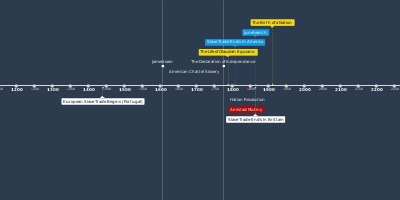31 Mai 1921 Jahr - Black Wall Street Massacre
Beschreibung:
AKA: Tulsa massacreGreenwood Massacre
After 19-year-old Dick Rowland, a black shoeshiner was accused of assaulting Sarah Page, the 17-year-old white elevator operator of the nearby Drexel Building, he was taken into custody and angry local whites gathered outside the courthouse where Rowland was being held. The spread of rumors he had been lynched, alarmed the local black population, some of whom arrived at the courthouse armed. Shots were fired and twelve people were killed: ten white and two black.
As news of these deaths spread throughout the city, mob violence exploded. White rioters rampaged through the black neighborhood that night and morning killing men and burning and looting stores and homes. Numerous eyewitnesses described airplanes carrying white assailants, who fired rifles and dropped firebombs on buildings, homes, and fleeing families. Law enforcement officials later said that the planes were to provide reconnaissance and protect against a "Negro uprising". Only around noon the next day did Oklahoma National Guard troops managed to get control of the situation by declaring martial law. About 10,000 black people were left homeless, and property damage amounted to more than $1.5 million in real estate and $750,000 in personal property (equivalent to $31.6 million in 2018).
Many survivors left Tulsa. Black and white residents who stayed in the city were silent for decades about the terror, violence, and losses of this event. The riot was largely omitted from local, state, and national histories.
Once one of the most prominent concentrations of African-American businesses in the United States during the early 20th century, Greenwood was popularly known as America's "Black Wall Street." When Tulsa became a booming and well-known town, many people considered Tulsa to be two separate cities rather than one city of united communities. The white residents of Tulsa referred to the area north of the Frisco railroad tracks as "Little Africa." The success of Black-owned businesses there led Booker T. Washington to visit in 1905 and encourage residents to continue to build and cooperate among themselves, reinforcing what he called "industrial capacity" and thus securing their ownership and independence.
Zugefügt zum Band der Zeit:
Datum:
31 Mai 1921 Jahr
Jetzt
~ 104 years ago
